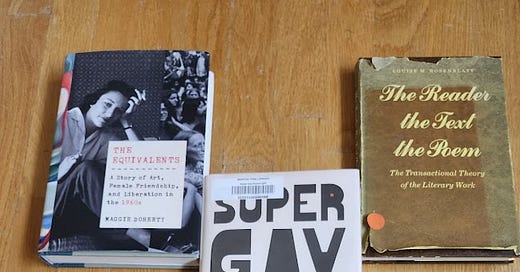Today I have five book recommendations for you, each related at least tangentially to poetry. Maybe you’re not really into poetry, but read on. The first four books each have a selling point that just might attract you; the fifth, while very much a book of poems, may just win you over to the magic of poetry. Intriguingly enough, I only noticed after compiling this mini-list that each has a female author.
Super Gay Poems: LGBTQIA+ Poetry After Stonewall, by Stephanie Burt:
Burt’s new book is the single best introduction I know of to the lives and issues of the gay community in America over the last 65 years. Burt presents 51 poems in chronological order and follows each with an essay that serves as an appreciation of the poem, a look at the life of the poet, and a discussion of how the poem’s ideas and form speaks to both joys and challenges. This book would be worthwhile if it were simply an anthology; with Burt’s astute commentary, it becomes truly great.
The Equivalents: A Story of Art, Female Friendship, and Liberation in the 1960s, by Maggie Doherty
This book ostensibly has a very narrow focus, but somehow manages to expand outward and touch on so many of the issues that confronted female creative artists in the mid-20th century (and still do, to some extent). It tells of the coming together of two poets, a sculptor, a painter, and a writer at the Institute for Independent Study at Radcliffe in the early 1960s. Many of the fellowship cohort were married with children and had neither the time, the money, nor the support of colleagues congenial for the making of art. The two poets, Anne Sexton and Maxine Kumin, get the majority of Doherty’s attention, and it’s thrilling to see how liberating and empowering the program proved to be for them. This is an excellent book for anyone who seeks even a temporary escape from parenting and work responsibilities, whether in educational opportunities or artistic creation.
The Reader, the Text, the Poem, by Louise M. Rosenblatt
Some seniors look to crossword puzzles (a passion of mine, by the way) to keep up their mental acuity. My choice for keeping the brain cells humming are books written primarily for an academic rather than a general audience, and my go-to topic for such reading is literary theory. I hope I haven’t turned you off yet, because, if you’re a serious reader at all, you’ll find much to interest you in Rosenblatt’s book, which is almost 50 years old. Rosenblatt uses the term “poem” to refer to the process whereby the reader of any literary text, not just a poem, interacts with the text, bringing their life and reading experiences to bear, and having their perceptions altered thanks to their reading. The book is relatively short, but you’ll want to take your time so that you understand Rosenblatt’s argument. Her writing is easy to follow if you don’t rush. I was reminded throughout of ideas I’ve used in teaching middle school students how to read more effectively by being aware of their thought process as they read, including the connections they make to self and to world. You are likely to be reminded of those times when you truly became engrossed in your reading and will appreciate how Rosenblatt considers your contribution to “the poem” to be unique and essential.
Also a Poet: Frank O’Hara, My Father, and Me, by Ada Calhoun
I’ll be bringing this book along this week to a poetry reading group I’m a member of, since we’re discussing Frank O’Hara, and I’m happy to pass it along to someone in the group who may want more of O’Hara once we’re done. Yet once again, here is a book that goes somewhere different than just poetry. It’s really about the relationship of Calhoun and her father, the late art critic Peter Schjeldahl, who worked on and off for many years on a biography of O’Hara. Calhoun tries to take the project up where her father left off, but the challenges are such that Calhoun wisely changes her focus. The end result is succinctly summed up by Calhoun’s subtitle. Once again, we have a universal theme: if you’ve ever been frustrated by the behavior of a parent, you’ll sympathize with Calhoun.
Grand Tour: Poems, by Eliza Gonzalez
As I get older, when it comes to books I’m buying less and giving away more, but I’m still buying poetry, because I know if the book is appealing enough, I will read it again and again. Here’s a methodology I use and recommend. When I become acquainted with a poet I think I might like, either based on a poem I read, or, in the case of Gonzalez, when I hear them on a poetry podcast, I borrow one of their books (in Gonzalez’ case, there’s only one to date) from the library. I’ll read the book and then return it, but if I catch myself missing the world the poet conjures, I’ll go and buy the book. With Gonzalez, two poems particularly, one about the death of her brother at a young age and one about her time in the “divided island” of Cyprus in 2018, wouldn’t loosen their grip on me. Borrow the book from your library and see if you agree.




